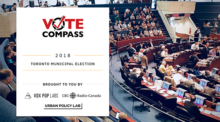On October 22, 2018, Toronto goes to the polls. For many, this year’s municipal election is particularly confusing: fewer wards, shifting boundaries, and in some cases, multiple incumbents facing off against each other. So how can voters make an informed choice?
The Urban Policy Lab, a hybrid teaching and research hub at the University of Toronto’s Munk School of Global Affairs and Public Policy, has partnered with Vox Pop Labs and the CBC to enhance the Toronto edition of Vote Compass, an online tool that makes it easy for voters to learn how their political views align with those of candidates running for office.
The Lab’s contribution to Vote Compass comes in the form of the Council Scorecard, a civic education project, developed in collaboration with journalist Matt Elliott, that aims to present municipal voting records in compelling and accessible new formats.
Thanks to data from the Council Scorecard – collected with the help of two recent MPP graduates, Alex Petras and Emily Frauts — Vote Compass users can now learn not only what mayoral and council candidates promise to do if elected, but also how these promises compare to the actual voting records of council incumbents.
“There are thousands of Council votes each year,” explains Urban Policy Lab founder and director Gabriel Eidelman. “All these votes are on the public record. But the information isn’t made available in a format that’s easy for people to understand.”
“What we’ve done with the Council Scorecard is cut through the noise to make it possible for the average person to make sense of how their representatives are voting on the issues that matter most.”
Since launching last week, nearly 38,000 Vote Compass users have benefited from voting information provided by the Scorecard.
Collaborating on Vote Compass is just the start for Eidelman and Elliott. Their plan is to grow the Scorecard as both a democratic accountability tool and as a platform for research comparing voting behaviour across municipalities.
“We’re looking to partner with researchers and practitioners to bring the Scorecard to other cities. We’d like to work with city officials, for example, to find ways to make council decisions more transparent and accessible — in Toronto, in the GTA, and, eventually, across the country,” says Eidelman.
“That process would produce an extraordinary resource for research on local decision making. We could investigate how financial contributions tie to council votes, whether we see patterns of votes by policy issue, whether certain mayors are more effective at marshalling votes... The possibilities are endless.”
October 12, 2018
